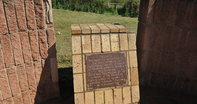
Spear of the Nation
In mid-1961, ANC leaders met in secret and took the fateful decision to create Umkhonto we Sizwe (MK), the Spear of the Nation, to wage an armed struggle against apartheid. Mandela was put in charge. The decision had a crucial proviso — attacks would be made on the property, and there would not be any killing of civilians.
This was based firstly on the ANC's belief in Mahatma Gandhi's policy of non-violence and secondly on the strategic view that killing whites would serve only to reinforce their fear of majority rule. With only a few exceptions, this policy was maintained for the next three decades. With the new policy in place, Mandela travelled through Africa and went to Britain and the Soviet Union.
The government was on guard for his return but he slipped back without being intercepted, coming in from the then Bechuanaland, now Botswana. The British colonial authorities there knew the exact moment and place of his entry into South Africa but did not tell Pretoria. I was told this by the security chief, Gerry Forrest, and believed him because I knew from previous interviews that he had a low opinion of the South African police and disliked his security counterparts because of their ideological zealotry.
One incident which had irritated him was when he drove to South Africa and a policeman at the border ordered him to open the bonnet of his car. 'Do you think I am hiding Mandela in the engine?' Forrest had asked sarcastically. In August 1962, Mandela was captured while travelling in Natal and was tried and jailed for incitement and leaving the country illegally.
Sentenced to Robben Island
Later, while imprisoned, the Rivonia raid took place and, using documentary evidence found there, he and other colleagues were put on trial on the far graver charges of seeking to overthrow the government by force. The death penalty was a heavy cloud over the trial and was feared as a real possibility.
Outside government circles it was thought at the time that it was only the strength of international pressures which caused the judge to draw back and instead impose life imprisonment on Mandela. Mandela was taken to Robben Island maximum-security prison as one of the 1 400 or so prisoners held there.
The government refused to acknowledge them as political prisoners and insisted that they receive the same level of imprisonment as ordinary criminal prisoners (except that the political prisoners were denied the virtually automatic one-third remission of sentence given to murderers, rapists and robbers).
Mandela had the lesser standards of food assigned to blacks compared with his coloured and Asian fellow-prisoners — and they all had even less than the whites, also jailed in the Rivonia Trial, who were kept at Pretoria Local prison.
Daily Mail Exposé
The Rand Daily Mail helped to improve life for Mandela and other black prisoners through our exposé of poor prison conditions in 1965. The government denied the truth of what we published and spent the next four years prosecuting our informants and finally the editor and myself as the reporter; however, at the same time, it acted to improve conditions.
A particular result for Mandela and others, relieving their winter misery in the cold concrete cells, was that they were given shoes and socks instead of rubber sandals (some prisoners didn't even have these but went barefoot); they were given long trousers instead of three-quarter-length 'tsotsi' ('gangster') shorts, and had jerseys as a matter of course.
The harsh conditions gradually eased and there was an end to the warders' brutality to which Mandela was at first subjected. Mandela continued to grow as a person.
His natural charisma and leadership qualities came to the fore. Not only did he lead the ANC men in the prison, but he was also respected by the ANC's political rivals — the Pan-Africanists and their Poqo offshoots, the small African Resistance Movement and the smaller Yu Chi Chan Club. Mandela was always available to give advice to anyone who wanted it. He was known for his calmness and willingness to listen to what others had to say.
 At the Tunis OAU summit in June 1994, a reporter described President Mandela as "the moral voice of Africa"....
At the Tunis OAU summit in June 1994, a reporter described President Mandela as "the moral voice of Africa".... Nelson Rolihlahla Mandela is a former president of South Africa, the first to be democratically elected after the apartheid system was aboli...
Nelson Rolihlahla Mandela is a former president of South Africa, the first to be democratically elected after the apartheid system was aboli...